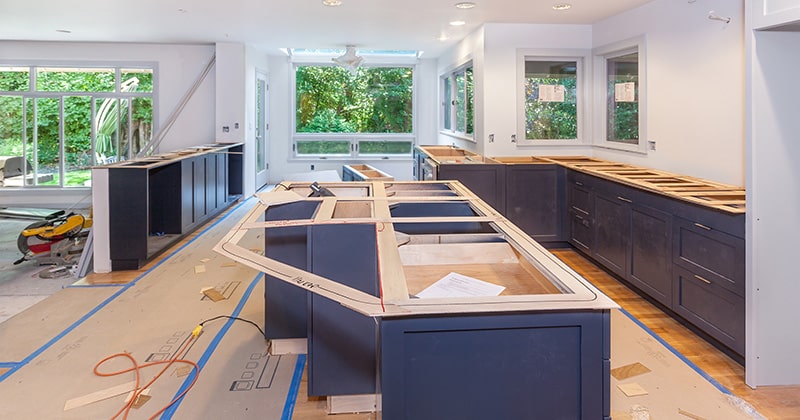How to Start a Remodeling Company
In this article, we’ll talk about why now is a great time to get into the remodeling industry. Then, we’ll walk you through how to start a remodeling company, step by step.

Guest Contributor
Home development is an expanding industry, bringing in $558.3 billion in 2022. This opens the market to new developers and businesses, as homeowners are constantly reinvesting in their homes.
There are many remodelers and renovation experts out there. Yet, there are often too many jobs for them to take on. As homeowners seek the right help, the demand for more remodeling services will rise.
In this article, we’ll talk about why now is a great time to get into the remodeling industry. Then, we’ll walk you through how to start a remodeling company, step by step.
Why You Should Start a Remodeling Business Now
The home remodeling industry as it stands today offers a lot of room for up-and-coming contractors. Whether you’re just starting out or have an established network and skillset, the market is wide open.
Remodeling is also a profitable field to get into. The average salary for a home remodeler is $110,027. And the market for housing development is growing by almost 4% each year.
There is more than enough room for new businesses to capitalize on this growth.
7 Steps for Starting a Remodeling Company
Now, let’s break down what it’ll take to get your remodeling business up and running.
1. Pick your business specialty

When starting your remodeling company, it’s best to dial in your area of expertise.
Think about what you want to specialize in as a business. Having a specialized skill, technique, or style to offer can help you stand out and corner the market in your area.
Home remodels can be anything from upgrading a deck or redoing a kitchen to a full remodel of the home interior. This leaves a lot of room to pick what you enjoy doing the most and can still profit from.
Contractor vs. Subcontractor
If you want to have a generalized and inclusive business, then maybe being a general contractor is the right move for you. This will broaden your market and potentially bring in more clients and higher-paying jobs.
Another option for your remodeling business is to work as a subcontractor. If you have a specialized skill or focus, then working under a contractor as a subcontractor may be better for you.
Subcontracting can open the door to building new business connections and developing your niche. This option is especially popular with people new to the business, as it allows you to develop skills and connections.
2. Evaluate the renovation market and create a business plan
The market for renovation is broad, so it’s good to know what the specifics look like in your area.
Knowing what type of projects, economic climate, and other businesses are in your area will help you to develop a successful business plan.
Here are some things to look into as you create your business plan:
What do your finances look like?
Evaluating your local market will help you know what kind of financial resources you’ll need to get started. For example, you may need a business loan to cover startup costs.
What kind of homeowners are in your area?
Are you living rurally or within a larger city? Knowing the population, demographics, and types of housing in your area is important when planning your remodeling business.
The most lucrative services to offer will depend on your community’s needs and preferences.
What other businesses and competitors are around?
How many other home renovators are within your area? What do their reviews look like?
Getting to know your competition will help you develop a business plan that can succeed within your market.
3. Get your renovation business licensed and insured

Next up is dialing in on the legal side of your business. Don’t worry—this doesn’t have to be daunting or overwhelming.
Getting a business set up is actually pretty straightforward these days. You just need to ensure the basics are covered to get established. After that, it’s mostly about staying up to date on license renewal and insurance payments.
What type of business should you register as?
Your three primary options for business registration will be an LLC, a sole proprietorship, and a corporation.
Limited liability company (LLC)
An LLC is the most popular type of business structure. It protects your company in case of a lawsuit and yields beneficial tax breaks.
In an LLC, your personal assets will also be separated from the company.
Sole proprietorship
Perhaps the most attractive benefit of a sole proprietorship is that it’s easy to set up. This structure will link the business to the owner directly.
Because of this, it’s cheap and offers tax benefits. However, it won’t protect you from personal liability.
Corporation
A corporation is an ideal business registration option if you’re planning to grow a large operation. It allows the business to operate separately from the owner.
The downside of this is that a corporation requires detailed record-keeping and reporting. They can also be more expensive to establish.
What kind of insurance do you need?
Having insurance for your business is a necessity in the remodeling industry. There are too many risks involved for both your business and the homeowner. Plus, you won’t book many jobs without it.
You should check what insurance is required in your area, but minimally, you’ll need home improvement contractor’s insurance.
Investopedia has a helpful breakdown of the best insurance companies for independent contractors that you can begin your research with.
You’ll also want to have general liability insurance. This will cover any physical injury that happens on the job and any property damage that occurs. It’ll protect both your employees and your company if an issue arises.
4. Obtain any necessary remodeling tools and training
Once your remodeling business is licensed and ready to go, you’ll need to ensure you have the knowledge and equipment necessary to complete jobs well.
This means everything from essential tools to training and skill development.
Is there any special training that might benefit your renovation business?
Depending on what your current skill set is, there might be different levels of training or certifications that you’ll need as a remodeler.
You can always subcontract out various projects. But having more skills in your repertoire will only make your business more profitable.
While it’s not always required, specialty remodeling certifications will make new clients much more likely to hire your business. You can get certified in anything from master kitchen remodeling to carpentry and home design.
What kind of tools will you need to get started?
First and foremost, you’ll need the appropriate safety gear to complete remodeling jobs. Safety equipment and personal protective equipment (PPE) will protect you and your employees.
Next, consider the types of jobs you’ll be working. You may need everything from basic carpentry tools to electrical equipment, the necessities for plumbing, and the safety equipment for a painting company.
Make a list of the tools you’ll need to start working on remodeling projects.
5. Start networking and marketing for your renovation business

While marketing may not be your focus or skill set, it’s critical to the success of your business.
Your website, for instance, must be up to date with accurate information about the services you provide and how to contact you. There are plenty of free platforms you can use to build your website, such as
Once you have a quality website, you can send people to it through various marketing channels. For example, you might spread the word about your remodeling company through local in-person networking, social media promotion, and email marketing.
If you need help with marketing, consider hiring a freelancer. It’s cheaper than bringing on an employee, and a freelance marketing specialist can keep up with the basics.
Check out these digital marketing tips for remodeling contractors.
Freelancer websites like Upwork have a lot of talented people who might be the right fit for your business.
6. Consider your team
If your business is growing rapidly, or if you’re starting with a big project on your hands, you may want to hire some help. It’s important to determine what type of employee you need and can afford.
Subcontractor vs. employee
If you’re not sure you need or want to hire a part or full-time employee, you may decide to work with a subcontractor.
A subcontractor might be the right choice if you need help with a specific aspect of a project rather than continuous assistance. For example, you could subcontract out electrical work or interior painting.
However, if you’re pretty busy with projects, you may need to hire more consistent help. This could include employees taking on roles in the office or contractors working on the job with you.
When you hire a permanent employee, you’ll have more help to handle your successful business. As a bonus, you’ll also get tax breaks through payroll.
7. Build relationships with suppliers

Word-of-mouth referrals are a big component of a successful remodeling business.
Research shows that 90% of people are much more likely to trust a brand that has been recommended to them. And word-of-mouth marketing is known to be more effective than paid ads, resulting in five times as many sales.
So, if you do a good job and handle business well, your clients will recommend you to their friends. The same thing goes for other contractors and suppliers within the industry.
Oftentimes, various contractors and subcontractors will work on projects together. They may even refer one another to different suppliers in the area.
If you maintain these relationships and build a good reputation, this could be a huge help to your new business.
These relationships will refer you to more work and potentially lead to deals with suppliers and more connections.
Always run your business with integrity and work hard, and you’ll see a huge return on your investment.
Next Steps for Starting a Remodeling Company
When you’re ready to dive into the remodeling industry, following the steps above will help you get your company established.
Not sure where to start with so much advice swimming around in your head? There are a few simple things you can do right now after reading this article to begin building your remodeling company.
- Make a list of your remodeling skills. Knowing what you’re knowledgeable and experienced in will help you choose the right specialty as a remodeler. Write down all the remodeling skills you have that you feel confident about. Circle your top 3-5 and start there to decide on your niche.
- Get to know your local demographics. Researching your local market is essential to creating a successful business plan. Head over to the U.S. Census Bureau’s website, where you can search your zip code, city, or county and get detailed demographic information.
- Sign up for a free website builder. The sooner you can get the word out about your remodeling company, the sooner you can get jobs. Sign up for one of the platforms we recommended above or another free website builder to create your remodeling website.
Selah is a freelance journalist. Her professional passions include psychology, sociology, and regenerative education. When she's not writing, you can find Selah traveling the world, cooking without a recipe, or catching an early morning surf.


